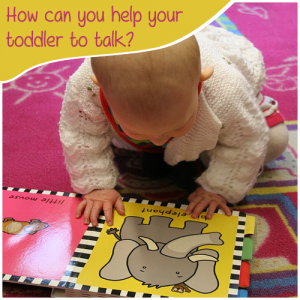 Remember the time when your baby used to turn its head in the direction of your voice? Not only do babies learn to recognize their mother’s voice right from the time they are in the womb,but they also have a natural interest in human voices.
Remember the time when your baby used to turn its head in the direction of your voice? Not only do babies learn to recognize their mother’s voice right from the time they are in the womb,but they also have a natural interest in human voices.
Babies also learn to understand words much before they can start speaking them. This means that words and sentences have already started forming in your toddler’s mind. From here on, you just have to help him enunciate these words.
How can you actually help?
Talk directly to your toddler:
Talking directly with your toddler is the best way for him/her to pick up sounds and words. You can do this from the first month itself and carry it on till toddler years.
Repeat repeat repeat:
Toddlers and babies form neurological sequences and patterns in their brains. Repetition helps them to crystallize these patterns. For example, every time you take your toddler for a bath, say, “It’s bath time now. I’m going to take your shirt off” and follow it up with the action of taking off the shirt. Do this every day, soon your toddler will try to speak these same words before you do!
Follow it up with actions:
Actions speak louder than words. This truer now, than it ever was. For your toddler to understand what each word or sentence means, try to follow it up with actions. For example, when it is breakfast time, say,” It’s your breakfast time now”, while showing him the plate of food. Initially he/she will not understand the word ‘breakfast’. But soon the association between the food plate and the word ‘breakfast’ will form.
Show emotions while talking:
Emotions magnify the message of your speech. It also helps the child identify positive and negative emotions. So the next time you are showing something to your child, infuse your voice with wonder. If you are cooing lovingly, modulate your voice to a softer tone ( this of course comes naturally) and so on.
Teaching about communication:
All talk is a communication, ie a 2 way process. So every time you talk to the child, wait for his response. Initially there will be none. But sooner or later, your child will try to fill in this silence with his/her own words.
Using short sentences too help a toddler is imitating a particular response or a sentence. So keep it short and simple